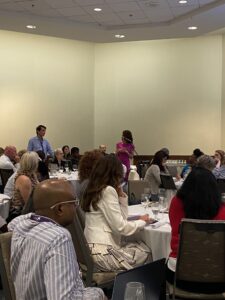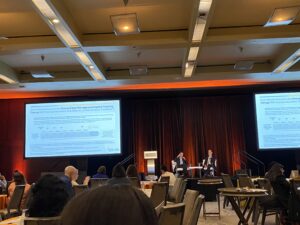Hannaneh Moradi: Does networking and expanding our network really matter?
I had a busy summer filled with various exciting work programs, visits, and conferences. Amid all this busyness, one thing became especially important to me: meeting new people and reconnecting with those I already knew. In communication terms, this is about networking and expanding my connections within my field of activity or interest.
Besides the purely scientific and research presentations and discussions during my visits, people on the sidelines, before and after meetings, at traditional dinner parties, and even during breaks, focused heavily on getting to know each other, making new contacts, and exchanging updates on the status of acquaintances. They also introduced themselves to others and groups.

I did this both consciously and unconsciously, as I was part of a conversation-rich environment. We all tried to listen carefully, ask relevant questions, and understand as much as possible about ongoing discussions in networking.
Then I reflected on why all of us seeking new opportunities are interested in networks, influential people, and overall networking. Based on what I observed, heard, and my own practical experience, I concluded that people try from the moment they introduce themselves until they establish a network of contacts, whether individuals, groups, or organizations, to build trust and legitimacy as well as to know new people.

I believe networking requires significant effort, energy, and time because we subconsciously feel that the more we introduce ourselves, our skills, and our achievements, the higher our chances of future progress and success. I’ve seen and experienced firsthand that when we network and meet new people, they often follow up on our work, projects, or overall status through communication channels. In such cases, the efforts and activities we undertake are visible within our network, and this can lead to discussions with others, creating a continuous chain of communication.
Moreover, when a network learns about the skills and actions of its members over time, the likelihood of being introduced to new opportunities or collaborations increases.

Networking, in this sense, is not just about exchanging contact information or having a brief conversation; it is about building a long-term channel of communication and shared understanding. Each interaction, no matter how small, can gradually become a key toward trust, credibility, and even collaboration. What I realized is that networks are alive; they breathe through interactions, follow-ups, and continued engagement. The real value emerges not necessarily at the very moment of introduction, but in how relationships are nurtured over time and how people remain genuinely curious about one another’s growth.
At the same time, networking is not a one-way street. It is as much about listening and offering support as it is about seeking opportunities. I noticed that the most meaningful connections were formed when there was reciprocity, when both sides shared experiences, advice, or even encouragement. In that sense, networking becomes less about strategic advantage and more about collective progress. It becomes a mutual investment in each other’s journeys, and that is perhaps why networks continue to expand, strengthen, and create spaces where both individuals and communities can thrive.
Hannaneh Moradi works as a doctoral researcher in the Neuro-Innovation PhD programme. Her research focuses on network identity evolution.